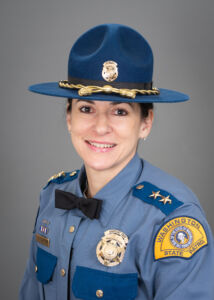 Women in Leadership Profile: Assistant Chief Martin
Women in Leadership Profile: Assistant Chief Martin
By Deb Moller
Assistant Chief Martin of the Washington State Patrol has a strong memory of being five years old, seeing a police car, and knowing that when she grew up, she would work in law enforcement. For AC Martin, this wasn’t the typical quickly passing whimsy of a five-year-old. Seeing that police car was a life-changing event.
In her Sudbury, Massachusetts high school, when her sense of humor and class clown antics amused her friends, none of them took her law enforcement talk seriously. She was just too far from the tough, athletic, Type A extravert that her high school friends associated with a law enforcement career. But AC Martin knew that law enforcement was where she belonged – even if others couldn’t see it.
Not that her childhood certainty meant that she didn’t face obstacles on the way to her dream job of being a state trooper. It took time, and exceptional mentors, to teach her that success often means doing things before you feel you are ready.
AC Martin earned a four-year degree in legal studies and sociology and had solid work experience with steady promotions. Even so, when it was time to take the test to qualify for a slot in the competitive Massachusetts State Police force, she didn’t feel ready. She didn’t take the test. If she’d come from a law enforcement family, or had a mentor guiding her, she would have been urged to try. But instead, AC Martin decided it would be best to join the National Guard, gain leadership experience as an officer, and ensure her qualifications would make her an unbeatable candidate for a law enforcement job.
She was right that this career detour meant she was extremely well-qualified for the state trooper position she landed with Washington State Patrol. When she was hired, she viewed the move across country as the price of working at her dream job. It didn’t seem too high of a price to pay.
AC Martin found she was right about being a state trooper – it was a job she loved and felt she was able to gain competence in every day. No two days brought the same challenges; she was never bored. She found she was wrong about being on the opposite coast from her family and friends. The vast distance was a bigger challenge than she expected. She had her dream job but not her dream life.
Fast forward several years. She marries a fellow law enforcement officer. They have two children. She is settled into a Sergeant’s job with WSP and the family has sorted out how to manage the myriad work and family demands they face each day. Her mother retires from her east coast job and moves in with the family to help with the children. AC Martin has an opportunity to take the test to become a Lieutenant. But she doesn’t feel ready to upset the hard-won schedules that make family and work life manageable. She isn’t ready to risk that. She doesn’t take the test.
Her mentor is surprised and angry. She sees the potential in AC Martin and knows the WSP needs women like her in higher leadership jobs. She challenges AC Martin to look beyond her own life and preferences and see the bigger picture. In two years, AC Martin is again eligible to take the Lieutenant exam. She does. As she moves up through the ranks, she often does not feel ready for the next step. She has learned she doesn’t have to feel ready. She just needs to listen to trusted mentors more than she listens to the sometimes-doubting voice in her head.
Just like her high school friends, people who meet AC Martin sometimes don’t see her as the stereotypical leader in law enforcement. She is more introvert than extravert, she trusts the power of conversation more than confrontation, she is sometimes too transparent rather than too guarded. Yet, through serving under exceptional leaders and enjoying the assistance of strong mentors, AC Martin continues to learn one of the most important lessons of leadership – you don’t have to be ready for the next challenge or the next job. Whether you succeed or fail, you just need to know that being willing to take the test is what matters.
y will not get you out of bed in the morning. Most of all, find what sparks your interest and your enjoyment. See? It isn’t rocket science.

Deb Moller is the former public-private partnerships manager at the Oregon Office of Emergency Management. She is a senior fellow at the Center of Excellence, Homeland Security -Emergency Management. As principal of Moller Consulting, Deb has over ten years of experience assisting local, state, federal and tribal governments, as well as private profit and not-for-profit organizations, achieve performance goals. Deb’s experience includes twenty years designing and managing adult education and job training programs for marginalized populations. She holds an M.A. in applied behavioral science from Bastyr University. She is the founder of Cascadia Calling, a community based earthquake preparedness organization.
Disclaimer
Information on this profile is provided with the understanding that the authors and publishers are not engaged in rendering professional advice or services. As such, it should not be used as a substitute for consultation with an professional adviser. Opinions expressed here represent the viewpoints of individuals authoring the profile and do not necessarily reflect the opinions or views of the Center of Excellence.


